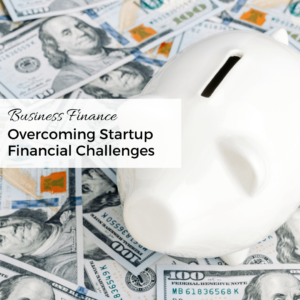Navigating the financial hurdles of starting a business is a daunting task for many entrepreneurs. While the allure of grants and angel investors is tempting, the reality is that most successful startups have thrived through bootstrapping and innovative financing strategies. This post delves into the real stories of renowned businesses that overcame their early financial challenges with resilience and creativity.
The Reality of Startup Financing
Starting a business is an adventure filled with unexpected expenses and financial challenges. Contrary to popular belief, securing grants or investments from venture angels is not the only path to success. Let’s explore how bootstrapping remains the backbone of startup financing, supported by real-life examples.Case Study 1: The Bootstrapped Success
Bootstrapping: This involves funding your startup through personal savings, revenue from the business, and operational frugality, avoiding external funding sources.- Apple: Steve Jobs and Steve Wozniak started Apple in a garage, funding their venture by selling personal items like a VW bus and a scientific calculator, and working from a makeshift office. Their scrappy beginnings led to the creation of the Apple I computer, setting the stage for the future of personal computing.
- Dell: Michael Dell started his company from his dorm room with just $1,000 in capital. By selling custom-built computers directly to consumers, he bypassed the retail markup, passing savings onto the customers and disrupting the PC industry.
- Hewlett-Packard: With an initial investment of only $538, Bill Hewlett and Dave Packard established HP. Their first product was an audio oscillator used by sound engineers, including at Walt Disney Studios for the movie “Fantasia,” demonstrating the potential of humble beginnings.
Case Study 2: Innovative Financing
- Kickstarter Campaigns (Crowdfunding): Oculus Rift’s campaign, raising $2.4 million, exemplifies crowdfunding’s potential to kickstart ventures. By presenting a compelling vision of virtual reality, Oculus attracted thousands of small backers, providing both funding and a passionate community.
- Presales: Pebble Technology’s smartwatch presale campaign on Kickstarter, amassing over $10 million, highlights presales’ effectiveness. By selling the idea before production, Pebble not only secured funds but also validated the market demand for smartwatches.
- License Deals: GoPro’s early licensing deal in Japan provided the necessary funds to diversify its product line. By allowing a Japanese company to use its brand and technology, GoPro tapped into new markets and revenue streams without significant investment.
Case Study 3: Community and Crowdfunding
- Exploding Kittens: A card game project that captivated the Kickstarter community, raising over $8 million from more than 200,000 backers. The game’s success was fueled by its humorous concept and the strong track record of its creators, showcasing the importance of community and branding in crowdfunding.
- Flow Hive: An innovative beehive design that charmed the Indiegogo community, securing over $13 million in funding. Its success was driven by its promise of making honey harvesting more humane and simple, tapping into the growing interest in sustainable and backyard beekeeping.
Overcoming Financial Hurdles: Key Strategies
The narratives of Apple, Dell, Oculus Rift, and others underscore the essence of financial creativity and strategic planning in overcoming startup financial challenges. By embracing bootstrapping, engaging in crowdfunding, and exploring unconventional financing routes, startups can navigate their early financial obstacles with confidence.What Doesn’t Work
You wouldn’t believe the number of brand-new entrepreneurs I hear from that assume they’re going to get tens of thousands of dollars of free grants for their business. (Pssst … if that were true, you wouldn’t need me, not for marketing and not even for advice.)Or they’ve heard that all they need to do is set up a kickstarter or gofundme and raise tons of money (forgetting that they don’t have a big enough audience who cares to give, and that it takes a LOT of work to market one of those to be successful).Or that a Venture Capital firm is just waiting with baited breath to give them all the funds! If only!This set of questions can help you critically assess your individual situation, resources, and the feasibility of different financing methods:- What stage is your business in?
- Are you in the idea phase, early development, or do you have a product/service ready to market? Different stages might be more suited to different financing options.
- How much capital do you need?
- Understanding the amount of funding required will help in determining whether to seek small contributions from a large group (crowdfunding) or significant investment from a few sources (angel investors, venture capital).
- What is your risk tolerance?
- Bootstrapping requires using personal funds and potentially incurring personal debt, which involves personal financial risk. Assess your comfort level with this risk.
- Do you have a prototype or proof of concept?
- Products with a tangible prototype or proof of concept may have better success with crowdfunding platforms, as backers can see what they are investing in.
- How strong is your network and community support?
- Crowdfunding and community-based funding models rely heavily on having a strong network and community willing to support and fund your idea. Evaluate the size and engagement level of your existing network.
- Are you willing and able to give up equity?
- Seeking investment from angel investors or venture capitalists often requires giving up a portion of your company’s equity. Consider how comfortable you are with this idea.
- What is your marketing and outreach capability?
- Successful crowdfunding campaigns require robust marketing efforts. Assess your ability to market your campaign effectively to reach your funding goals.
- Do you have a compelling story or mission?
- Projects with a compelling story, mission, or social impact often perform well in crowdfunding platforms, as they resonate more with potential backers.
- Are you prepared for the obligations that come with funding?
- Different funding sources come with different obligations, from fulfilling rewards in a crowdfunding campaign to providing regular business updates to investors. Are you ready to meet these obligations?
- What is the timeline for needing the funds?
- Some funding options like venture capital can take a long time to secure, while others like crowdfunding can be quicker but require preparation and campaign time.
- Are grants a realistic option for your industry and business model?
- While grants are attractive due to their non-repayable nature, they are often highly competitive and restricted to specific industries or purposes. Assess if your business fits within these confines and if the effort to apply is justified by the likelihood of success.
- How scalable is your business idea?
- Scalability is a crucial factor for many investors, especially in venture capital. If your business model shows potential for rapid growth, seeking equity investment might be more appropriate.
Get the marketing advice I share with my entrepreneur friends ...
... right in your inbox









